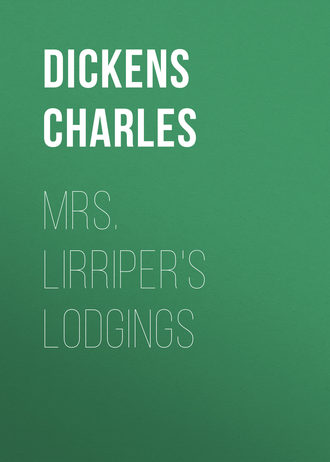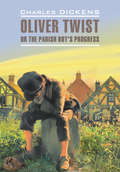
Чарльз Диккенс
Mrs. Lirriper's Lodgings
The miles and miles that me and the Major have travelled with Jemmy in the dusk between the lights are not to be calculated, Jemmy driving on the coach-box which is the Major’s brass-bound writing desk on the table, me inside in the easy-chair and the Major Guard up behind with a brown-paper horn doing it really wonderful. I do assure you my dear that sometimes when I have taken a few winks in my place inside the coach and have come half awake by the flashing light of the fire and have heard that precious pet driving and the Major blowing up behind to have the change of horses ready when we got to the Inn, I have half believed we were on the old North Road that my poor Lirriper knew so well. Then to see that child and the Major both wrapped up getting down to warm their feet and going stamping about and having glasses of ale out of the paper matchboxes on the chimney-piece is to see the Major enjoying it fully as much as the child I am very sure, and it’s equal to any play when Coachee opens the coach-door to look in at me inside and say “Wery ’past that ’tage. – ’Prightened old lady?”
But what my inexpressible feelings were when we lost that child can only be compared to the Major’s which were not a shade better, through his straying out at five years old and eleven o’clock in the forenoon and never heard of by word or sign or deed till half-past nine at night, when the Major had gone to the Editor of the Times newspaper to put in an advertisement, which came out next day four-and-twenty hours after he was found, and which I mean always carefully to keep in my lavender drawer as the first printed account of him. The more the day got on, the more I got distracted and the Major too and both of us made worse by the composed ways of the police though very civil and obliging and what I must call their obstinacy in not entertaining the idea that he was stolen. “We mostly find Mum” says the sergeant who came round to comfort me, which he didn’t at all and he had been one of the private constables in Caroline’s time to which he referred in his opening words when he said “Don’t give way to uneasiness in your mind Mum, it’ll all come as right as my nose did when I got the same barked by that young woman in your second floor” – says this sergeant “we mostly find Mum as people ain’t over-anxious to have what I may call second-hand children. You’ll get him back Mum.” “O but my dear good sir” I says clasping my hands and wringing them and clasping them again “he is such an uncommon child!” “Yes Mum” says the sergeant, “we mostly find that too Mum. The question is what his clothes were worth.” “His clothes” I says “were not worth much sir for he had only got his playing-dress on, but the dear child! – ” “All right Mum” says the sergeant. “You’ll get him back Mum. And even if he’d had his best clothes on, it wouldn’t come to worse than his being found wrapped up in a cabbage-leaf, a shivering in a lane.” His words pierced my heart like daggers and daggers, and me and the Major ran in and out like wild things all day long till the Major returning from his interview with the Editor of the Times at night rushes into my little room hysterical and squeezes my hand and wipes his eyes and says “Joy joy – officer in plain clothes came up on the steps as I was letting myself in – compose your feelings – Jemmy’s found.” Consequently I fainted away and when I came to, embraced the legs of the officer in plain clothes who seemed to be taking a kind of a quiet inventory in his mind of the property in my little room with brown whiskers, and I says “Blessings on you sir where is the Darling!” and he says “In Kennington Station House.” I was dropping at his feet Stone at the image of that Innocence in cells with murderers when he adds “He followed the Monkey.” I says deeming it slang language “O sir explain for a loving grandmother what Monkey!” He says “Him in the spangled cap with the strap under the chin, as won’t keep on – him as sweeps the crossings on a round table and don’t want to draw his sabre more than he can help.” Then I understood it all and most thankfully thanked him, and me and the Major and him drove over to Kennington and there we found our boy lying quite comfortable before a blazing fire having sweetly played himself to sleep upon a small accordion nothing like so big as a flat-iron which they had been so kind as to lend him for the purpose and which it appeared had been stopped upon a very young person.
My dear the system upon which the Major commenced and as I may say perfected Jemmy’s learning when he was so small that if the dear was on the other side of the table you had to look under it instead of over it to see him with his mother’s own bright hair in beautiful curls, is a thing that ought to be known to the Throne and Lords and Commons and then might obtain some promotion for the Major which he well deserves and would be none the worse for (speaking between friends) L. S. D. – ically. When the Major first undertook his learning he says to me:
“I’m going Madam,” he says “to make our child a Calculating Boy.
“Major,” I says, “you terrify me and may do the pet a permanent injury you would never forgive yourself.”
“Madam,” says the Major, “next to my regret that when I had my boot-sponge in my hand, I didn’t choke that scoundrel with it – on the spot – ”
“There! For Gracious’ sake,” I interrupts, “let his conscience find him without sponges.”
“ – I say next to that regret, Madam,” says the Major “would be the regret with which my breast,” which he tapped, “would be surcharged if this fine mind was not early cultivated. But mark me Madam,” says the Major holding up his forefinger “cultivated on a principle that will make it a delight.”
“Major” I says “I will be candid with you and tell you openly that if ever I find the dear child fall off in his appetite I shall know it is his calculations and shall put a stop to them at two minutes’ notice. Or if I find them mounting to his head” I says, “or striking anyways cold to his stomach or leading to anything approaching flabbiness in his legs, the result will be the same, but Major you are a clever man and have seen much and you love the child and are his own godfather, and if you feel a confidence in trying try.”
“Spoken Madam” says the Major “like Emma Lirriper. All I have to ask, Madam, is that you will leave my godson and myself to make a week or two’s preparations for surprising you, and that you will give me leave to have up and down any small articles not actually in use that I may require from the kitchen.”
“From the kitchen Major?” I says half feeling as if he had a mind to cook the child.
“From the kitchen” says the Major, and smiles and swells, and at the same time looks taller.
So I passed my word and the Major and the dear boy were shut up together for half an hour at a time through a certain while, and never could I hear anything going on betwixt them but talking and laughing and Jemmy clapping his hands and screaming out numbers, so I says to myself “it has not harmed him yet” nor could I on examining the dear find any signs of it anywhere about him which was likewise a great relief. At last one day Jemmy brings me a card in joke in the Major’s neat writing “The Messrs. Jemmy Jackman” for we had given him the Major’s other name too “request the honour of Mrs. Lirriper’s company at the Jackman Institution in the front parlour this evening at five, military time, to witness a few slight feats of elementary arithmetic.” And if you’ll believe me there in the front parlour at five punctual to the moment was the Major behind the Pembroke table with both leaves up and a lot of things from the kitchen tidily set out on old newspapers spread atop of it, and there was the Mite stood upon a chair with his rosy cheeks flushing and his eyes sparkling clusters of diamonds.
“Now Gran” says he, “oo tit down and don’t oo touch ler people” – for he saw with every one of those diamonds of his that I was going to give him a squeeze.
“Very well sir” I says “I am obedient in this good company I am sure.” And I sits down in the easy-chair that was put for me, shaking my sides.
But picture my admiration when the Major going on almost as quick as if he was conjuring sets out all the articles he names, and says “Three saucepans, an Italian iron, a hand-bell, a toasting-fork, a nutmeg-grater, four potlids, a spice-box, two egg-cups, and a chopping-board – how many?” and when that Mite instantly cries “Tifteen, tut down tive and carry ler ’toppin-board” and then claps his hands draws up his legs and dances on his chair.
My dear with the same astonishing ease and correctness him and the Major added up the tables chairs and sofy, the picters fenders and fire-irons their own selves me and the cat and the eyes in Miss Wozenham’s head, and whenever the sum was done Young Roses and Diamonds claps his hands and draws up his legs and dances on his chair.
The pride of the Major! (“Here’s a mind Ma’am!” he says to me behind his hand.)
Then he says aloud, “We now come to the next elementary rule, – which is called – ”
“Umtraction!” cries Jemmy.
“Right,” says the Major. “We have here a toasting-fork, a potato in its natural state, two potlids, one egg-cup, a wooden spoon, and two skewers, from which it is necessary for commercial purposes to subtract a sprat-gridiron, a small pickle-jar, two lemons, one pepper-castor, a blackbeetle-trap, and a knob of the dresser-drawer – what remains?”
“Toatin-fork!” cries Jemmy.
“In numbers how many?” says the Major.
“One!” cries Jemmy.
(“Here’s a boy, Ma’am!” says the Major to me behind his hand.) Then the Major goes on:
“We now approach the next elementary rule, – which is entitled – ”
“Tickleication” cries Jemmy.
“Correct” says the Major.
But my dear to relate to you in detail the way in which they multiplied fourteen sticks of firewood by two bits of ginger and a larding needle, or divided pretty well everything else there was on the table by the heater of the Italian iron and a chamber candlestick, and got a lemon over, would make my head spin round and round and round as it did at the time. So I says “if you’ll excuse my addressing the chair Professor Jackman I think the period of the lecture has now arrived when it becomes necessary that I should take a good hug of this young scholar.” Upon which Jemmy calls out from his station on the chair, “Gran oo open oor arms and me’ll make a ’pring into ’em.” So I opened my arms to him as I had opened my sorrowful heart when his poor young mother lay a dying, and he had his jump and we had a good long hug together and the Major prouder than any peacock says to me behind his hand, “You need not let him know it Madam” (which I certainly need not for the Major was quite audible) “but he is a boy!”
In this way Jemmy grew and grew and went to day-school and continued under the Major too, and in summer we were as happy as the days were long, and in winter we were as happy as the days were short and there seemed to rest a Blessing on the Lodgings for they as good as Let themselves and would have done it if there had been twice the accommodation, when sore and hard against my will I one day says to the Major.
“Major you know what I am going to break to you. Our boy must go to boarding-school.”
It was a sad sight to see the Major’s countenance drop, and I pitied the good soul with all my heart.
“Yes Major” I says, “though he is as popular with the Lodgers as you are yourself and though he is to you and me what only you and me know, still it is in the course of things and Life is made of partings and we must part with our Pet.”
Bold as I spoke, I saw two Majors and half-a-dozen fireplaces, and when the poor Major put one of his neat bright-varnished boots upon the fender and his elbow on his knee and his head upon his hand and rocked himself a little to and fro, I was dreadfully cut up.
“But” says I clearing my throat “you have so well prepared him Major – he has had such a Tutor in you – that he will have none of the first drudgery to go through. And he is so clever besides that he’ll soon make his way to the front rank.”
“He is a boy” says the Major – having sniffed – “that has not his like on the face of the earth.”
“True as you say Major, and it is not for us merely for our own sakes to do anything to keep him back from being a credit and an ornament wherever he goes and perhaps even rising to be a great man, is it Major? He will have all my little savings when my work is done (being all the world to me) and we must try to make him a wise man and a good man, mustn’t we Major?”
“Madam” says the Major rising “Jemmy Jackman is becoming an older file than I was aware of, and you put him to shame. You are thoroughly right Madam. You are simply and undeniably right. – And if you’ll excuse me, I’ll take a walk.”
So the Major being gone out and Jemmy being at home, I got the child into my little room here and I stood him by my chair and I took his mother’s own curls in my hand and I spoke to him loving and serious. And when I had reminded the darling how that he was now in his tenth year and when I had said to him about his getting on in life pretty much what I had said to the Major I broke to him how that we must have this same parting, and there I was forced to stop for there I saw of a sudden the well-remembered lip with its tremble, and it so brought back that time! But with the spirit that was in him he controlled it soon and he says gravely nodding through his tears, “I understand Gran – I know it must be, Gran – go on Gran, don’t be afraid of me.” And when I had said all that ever I could think of, he turned his bright steady face to mine and he says just a little broken here and there “You shall see Gran that I can be a man and that I can do anything that is grateful and loving to you – and if I don’t grow up to be what you would like to have me – I hope it will be – because I shall die.” And with that he sat down by me and I went on to tell him of the school of which I had excellent recommendations and where it was and how many scholars and what games they played as I had heard and what length of holidays, to all of which he listened bright and clear. And so it came that at last he says “And now dear Gran let me kneel down here where I have been used to say my prayers and let me fold my face for just a minute in your gown and let me cry, for you have been more than father – more than mother – more than brothers sisters friends – to me!” And so he did cry and I too and we were both much the better for it.






